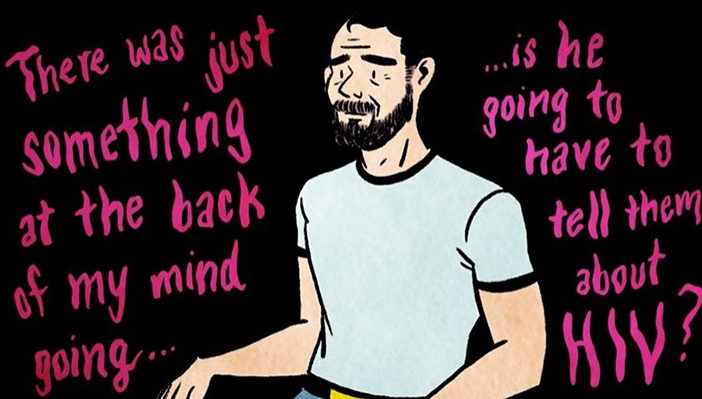World AIDS Day on 1 December is an opportunity for people worldwide to unite in the fight against HIV. Established in 1988, ‘rocking the red ribbon’ shows support for people living with HIV and commemorates those who have died from an AIDS-related illness.
Dr Tom Witney recently carried out research for The Open University to better understand relationships where one partner is HIV positive and the other is HIV negative; sometimes called magnetic, serodifferent or serodiscordant relationships.
Thirty gay and bisexual men in relationships shared their thoughts and feelings which, with the support of Damn Fine Media, was transformed into this animated video to bring to life the findings.
As this research found, for many, HIV doesn’t impact day-to-day life. By taking a pill daily, transmission of the virus reduces the amount of the virus to ‘undetectable’ levels, also known as having an undetectable viral load. When treatment is taken by the HIV positive partner, HIV is untransmissible, which is what is meant by the phrase ‘U=U’, ‘undetectable = untransmissible.
However, with the National AIDS Trust reporting that the majority of people they surveyed believed that HIV can still be contracted even if someone with HIV has an undetectable viral load, there’s still a great deal of awareness-raising required.
The stigma around HIV continues to have a damaging impact, with HIV positive participants of Dr Witney’s study saying that they had experienced rejection because of their status or felt responsible for their partner’s health. Some HIV positive and HIV negative participants used their relationships to raise awareness and educate others about U=U, but others thought carefully before talking to family and friends because of concerns about what they might think.
Dr Witney commented:
“My research shows the way that HIV stigma can permeate the lives of people living with the virus and their partners. Even though HIV “didn’t matter” to them in the day-to-day it still coloured the way that they talked about their relationship and who they spoke about the difference in their status to.
“In addition to this, we know that many of the issues faced by people living with HIV in the UK aren’t always directly related to the virus, but are symptoms of wider issues around homophobia, racism and sexism.”
Last year, the Government launched an HIV Action Plan and pledged to end new cases of HIV in England by 2030. But as the HIV Commission’s video explains, although we’ve come a long way there’s still further to go and reducing the stigma is an important step on the journey.
Dr Witney continues:
“People living with HIV deserve to be able to live without stigma regardless of whether they are undetectable or not. It’s important that we all act in addressing the wider attitudes towards HIV and show our support by being active HIV allies.”
Find out more
About World AIDS Day and how you can support, by visiting: https://www.worldaidsday.org/about/
Delve deeper into Dr Witney’s research via the OU’s free learning site, OpenLearn



